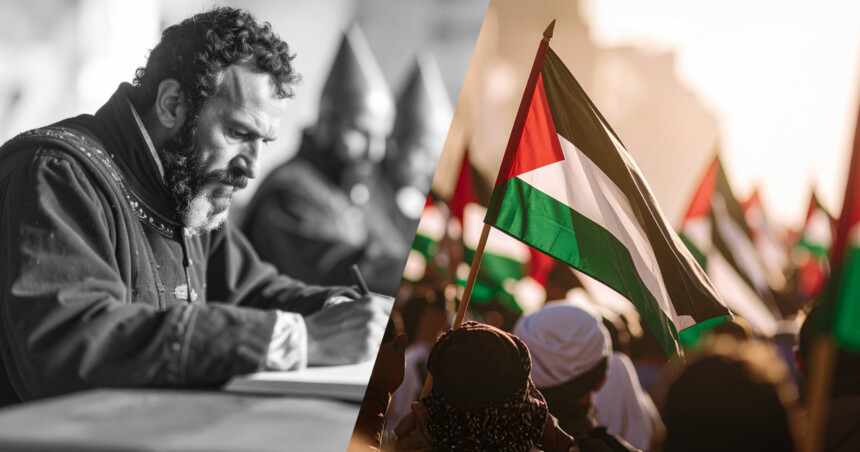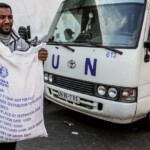The first responders following the First Crusade in 1099 — where up to 70,000 people were killed — were poets. [1] [2]
In the Prophet’s time (ﷺ), poets like Hassan bin Thābit used their poetic skill to lampoon Islam’s enemies. In the Crusades, it was the words of Abu l-Muzaffar al-Abīwardī (d. 1113) and Ahmad bin Muhammad bin al-Khayyāt (d. 1123) that were the first to arouse the Muslims of Bilād al-Sham into a response.
What the poems focus on is a description of the loss of life, subjugation of women, the preponderance of disbelief over belief, and the need for the Muslim world to unify and strengthen themselves and thus repel the crusader threat.
The internal schisms, Seljuk disunity, political fragmentation following the deaths of many Muslim leaders, the taking of Jerusalem by surprise, a state of apathy from the Caliph in Baghdad, were all factors that contributed to the weakness of the Muslims and its inability to retake Jerusalem as quickly as the poets would have hoped.
Poetry as protest, from minbar to masses
On a Friday in August 1099, almost a month after the capture of Jerusalem, a delegation left Damascus accompanied by the Qādi of Damascus, Zayn al-Dīn Abu Saʿd al-Harawī.
They reached Baghdad in Ramadan of 1099 and requested support from the Abbasid Caliph al-Mustazhir and the Sultan Barkiyāruq against the Franks. The Qādi stood up and conveyed the news to the others, offering a very moving account of the suffering.
Ibn Taghrībirdī details how the poem composed by Abu l-Muzaffar al-Abīwardī was recited by al-Harawī to the congregation in the mosque.
This became an occasion for strong emotions, and listeners wept freely:
(4) Dare you slumber in the blessed shade of safety, where life is as soft as an orchard flower?
(5) How can the eye sleep between the lids at a time of disasters that would waken any sleeper?”
Also in al-Abīwardī’s line, we find the following:
(8) When blood has been spilt, when sweet girls must for shame hide their lovely faces in their hands!”
The poets’ lines were likely to have been especially evocative in rousing anger in their listeners, since both al-Abīwardī and Ibn al-Khayyāt drew strong attention to the suffering of Muslim women and children.
This, from Ibn al-Khayyāt’s poem:
(28) And how many young girls have begun to beat their throats and cheeks out of fear.
(29) And how many girls have not felt the heat [of the day] nor tasted the chill of the night.
(30) They are weakened and wasted away with grief and emotion.
(31) So guard your religion and the inviolable ones; a legal profession for those who do not see loss in death.”
Previous Muslim victories inspire new ones
While rousing a strong emotional response, a spirit of buoyancy also existed.
The call for jihād was bolstered by calls to remember previous Muslim victors and illustrious triumphs.
al-Abīwardī states,
(3) O Sons of Islam, indeed behind you are battles in which heads rolled at your feet.” [3]
Ibn al-Khayyāt makes specific reference to the feats of Alp Arslan (d. 1072):
(41) His remembrance continues to remain like the guiding stars, and higher than the glorious Sun.
(42) So that you return to the virtues and loftiness of what was before.” [4]
The state of weakness that saw the crusaders turn their ransacking of Jerusalem into a settlement and the creation of the Latin Kingdom did not prevent Muslims from doing what was in their capability to resist the crusader onslaught.
Where the first poetic responses came from al-Abīwardī and Ibn al-Khayyāt, the first theological response came from the Shāfi’ī faqīh of Damascus, ‘Ali bin Tāhir al-Sulamī.
al-Sulamī was also a grammarian who taught in the Umayyad Mosque of Damascus. His Kitāb al-Jihād (Book of Jihād) published in 1105 is believed to be the first treatise on jihād to be produced after the arrival of the Franks in the Near East.
For al-Sulamī, the capture of Jerusalem was part of a wider Christian military scheme that began with conflicts in Sicily and Spain.
Path to unity and a military response
In political terms, however, jihād was not the primary response to the arrival of the crusaders.
It took some decades before the Muslims of Syria were able to forego their political and religious disputes and unite under the banner of jihād and see their struggle as inherently religious, led by a committed political leadership to fight against the crusaders.
By 1144, when the ruler of Mosul, ‘Imād al-Dīn Zengi, captured the crusader state of Edessa, the tide had turned. Muslim poets began to speak a unified language, one centred on the Reconquest of Jerusalem.
From Ibn al-Qaysarānī, Ibn Munīr al-Tarabulsi, ‘Imād al-Dīn al-Isfahānī, to countless others, they picked up on the resonating voices of their earlier predecessors al-Abīwardī and Ibn al-Khayyāt. The great interest in the recovery of Jerusalem following the capture of Edessa can be discerned from subsequent victories against the Franks, events that were seen as promising precursors to the eventual liberation of Jerusalem.
Following Nūr al-Dīn’s victory at the Battle of Inab in 544/1149, in which Prince Raymond of Antioch was killed, it was Jerusalem — and al-Aqsa Mosque specifically — that was the primary focus of Ibn al-Qaysarānī. Poets frequently wrote their verses following a conquest.
The poetry reveals that confidence in Syria was mounting following the victory at Edessa in 538/1144; the prospect of Muslim reprisals began to seem more likely with the recent spate of successes on the battlefield. [5]
Rise of the globe’s collective conscience
Throughout history, activism has been a catalyst for monumental change, and today’s student-led protests against the genocide in Gaza are no exception.
These encampments, which spanned over 36 universities across the UK and nearly every state in the US, echo the fearless legacy of students who have been at the forefront of justice for decades. From the civil rights movement to Vietnam War protests and the fight against apartheid, students have consistently challenged injustice and influenced the course of history.
Like yesterday, today the tide is beginning to turn, seismic plates have shifted; Palestine has become the moral centre of our world.
From mosques to streets, music festivals to lone cafes in downtown Dubin, to a global boycott of Israeli goods, voicing support for an end to the genocide in Gaza and condemnation of Israel has become more popular than ever before. And with the creation of new sites of resistance all around the world — from university campus halls to the shutting down of military sites — the demand to stop the sadistic killing machine of Israel has never been louder.
It is this international outcry at the sadism of the Israeli government combined with the support for Palestinian rights that is akin to the first battle cry in the Muslim response to the Crusades. The difference in this is that it is a global voice that speaks.
In the Crusades, the poets used the skill they had, and put that skill to important use. In the Qur’ān, we find an example of responders who had an Ākhirah-centric world-view; this should be the motivation of the believer.
In the context of the Qur’ānic verses that describe this incident, a group from the Children of Israel forbade a party who were attempting to bypass a commandment given to them. When they were asked why they would even bother with such a rebellious people, the upright believers responded, “Just to be free from your Lord’s blame, and so perhaps they may abstain.” [6]
Ask them [O Prophet] about [the people of] the town which was by the sea, who broke the Sabbath. During the Sabbath, [abundant] fish would come to them clearly visible, but on other days the fish were never seen. In this way We tested them for their rebelliousness.
When some of [the righteous among] them questioned [their fellow Sabbath-keepers], ‘Why do you [bother to] warn those [Sabbath-breakers] who will either be destroyed or severely punished by Allah?’ They replied, ‘Just to be free from your Lord’s blame, and so perhaps they may abstain.’” [7]
We learn, therefore, to never criticise a good action, founded on Islamic principles, that sincerely seeks a positive outcome.
The believers replied that their actions were motivated by a full conviction that one day they will stand before Allah, and in forbidding their fellow men from the wrong they were doing, they would have an excuse for not turning a blind eye to the wrong but actively redressing it.
Planting seeds in the rubble
Sometimes, it is an action put to sincere and effective use that creates a culture for tomorrow. The ones who act rightly today become the world’s champions tomorrow.
In an Al Jazeera report, one of its chapters entitled Gaza’s Superheroes describes a man named Hamada Shaqoura, whose initiative is to feed children. Following the birth of his son, he had felt a greater empathy towards others.
He told the broadcaster,
We always try to make things that make the children happy.” [8]
Shaqoura is one example of a community coming together with virtually no means.
Another example from the report shows children at a bombed location. A child, with rubble surrounding her in every direction, said,
This is my home. We used to sleep here. But when they hit the house, my uncle was killed, and my other uncle … We all came out from under the rubble, wounded but — thank Allah — we healed.” [8]
These examples stem from an imagining of how another person feels, knowing one cannot fully understand the complexities of each human encounter, especially in such precarious moments.
No human encounter is simple and “no quantity of meaning, no matter how sincerely ascribed, can void the subjective quality of each meeting.” [9]
The real first responders are the millions who were victims of this horrendous genocide. Their courage, compassion, and resistance to a brutal campaign of terror and ethnic cleansing will awaken the souls of countless others.
Remember that each person’s days are limited and that the things we do today could help to harness a stronger spirit of work tomorrow. Not only are the responses we take to counter a genocide perhaps akin to saving a life — to alleviating a suffering, to preventing a harm, to forestalling a harm, to speaking a word of truth, to forbidding an act of gross evil — they are also to be remembered as acts that sow the ground of positive work tomorrow, since others can be motivated by our positive work today.
The Prophet’s Companion (ﷺ), Abdullah ibn Salām, said,
If you hear that the Dajjal has come out while you are planting young palm trees, it is not too late to plant it, for people will still have livelihood after that.” [10]
Source: Islam21c
Notes
[1] Ibn al-Athīr, al-Kāmil fī al-Tārīkh, ed. ʿUmar ʿAbd al-Salām al-Tadmurī (Beirut: Dār al-Kutub al-ʿArabī, 2006), 9:425
[2] Sahīh al-Bukhārī, 4,123; al-Adāb al-Mufrad, 862
[3] Osman Latiff, The Cutting Edge of the Poet’s Sword (Brill, 2018). p. 72.
[4] Ibn al-Khayyāt, Dīwān, 182–187; Osman Latiff, The Cutting Edge of the Poet’s Sword (Brill, 2018). p. 72.
[5] Osman Latiff, The Cutting Edge of the Poet’s Sword (Brill, 2018). p. 88.
[6] al-Qur’ān, 7:164
[7] al-Qur’ān, 7:163-4
[8] https://youtu.be/slq1YbQsTSg
[9] T. Snyder, Black Earth: The Holocaust as History and Warning (Vintage, 2016). p. 309.
[10] al-Adāb al-Mufrad, Book 27, Hadīth 5







